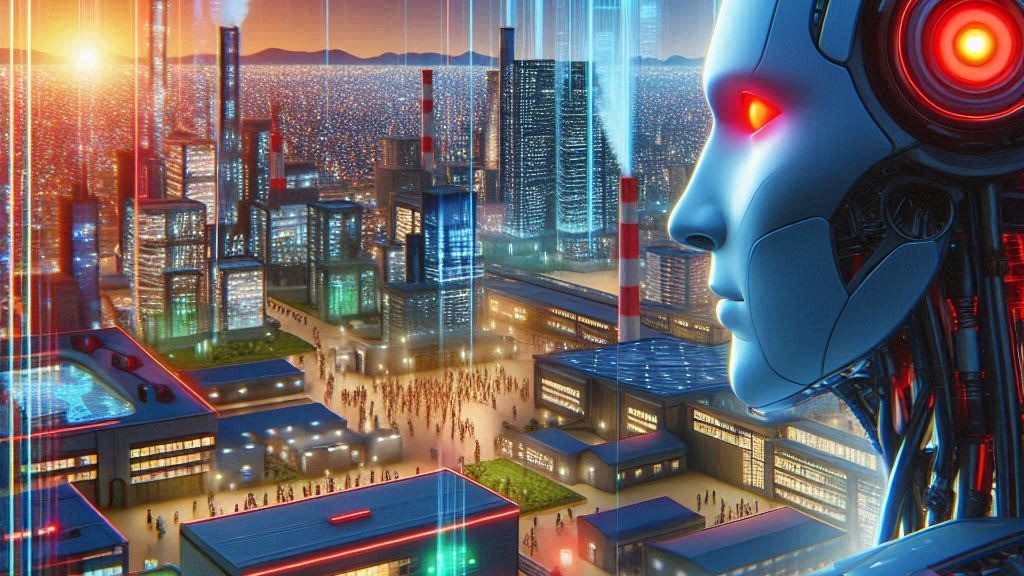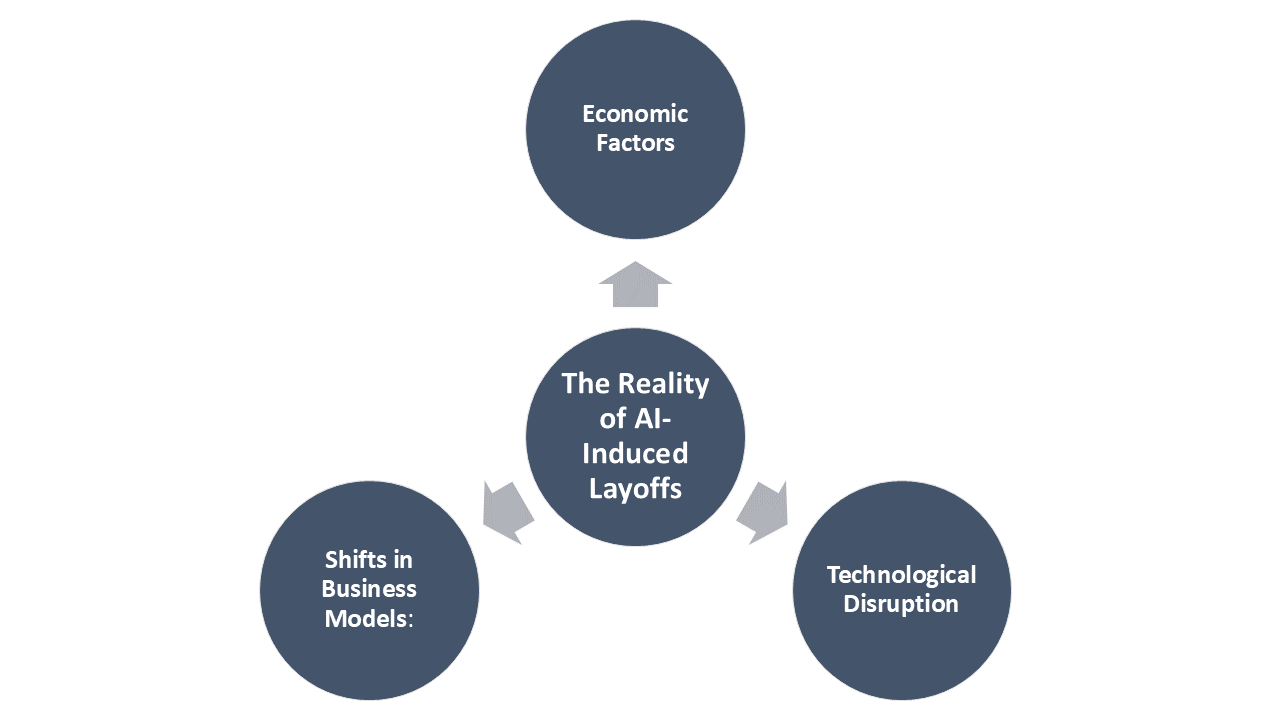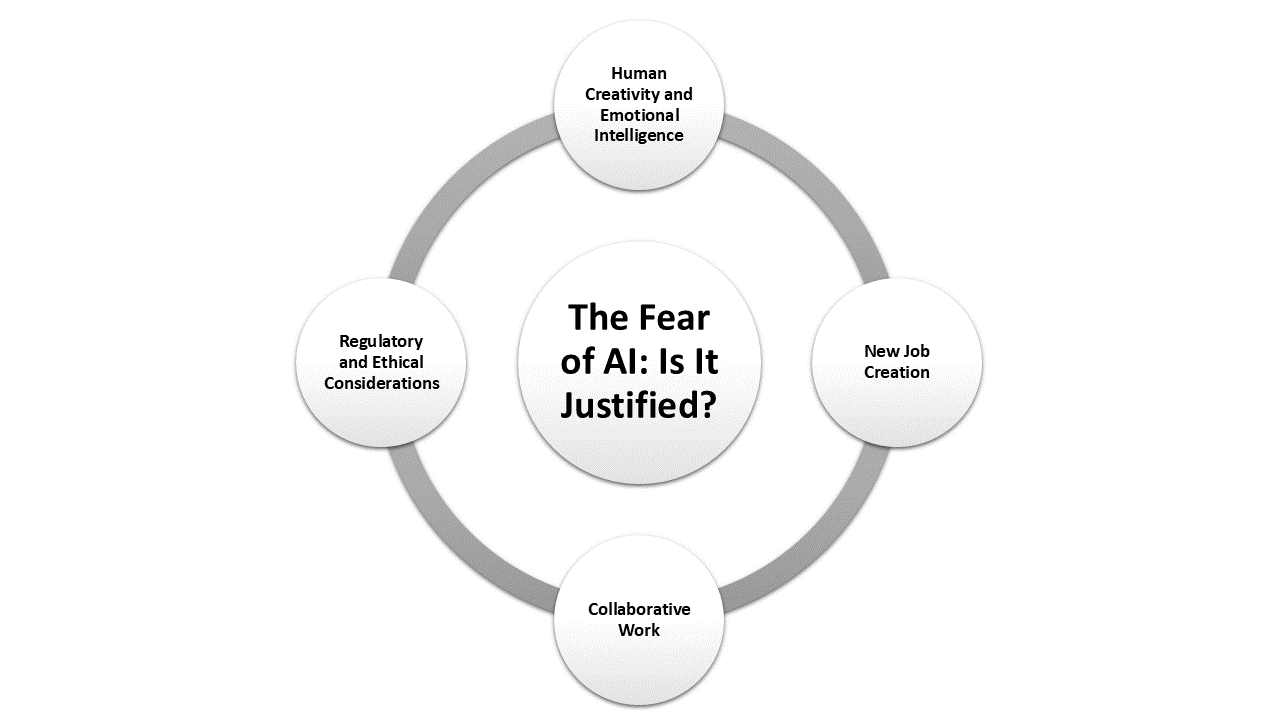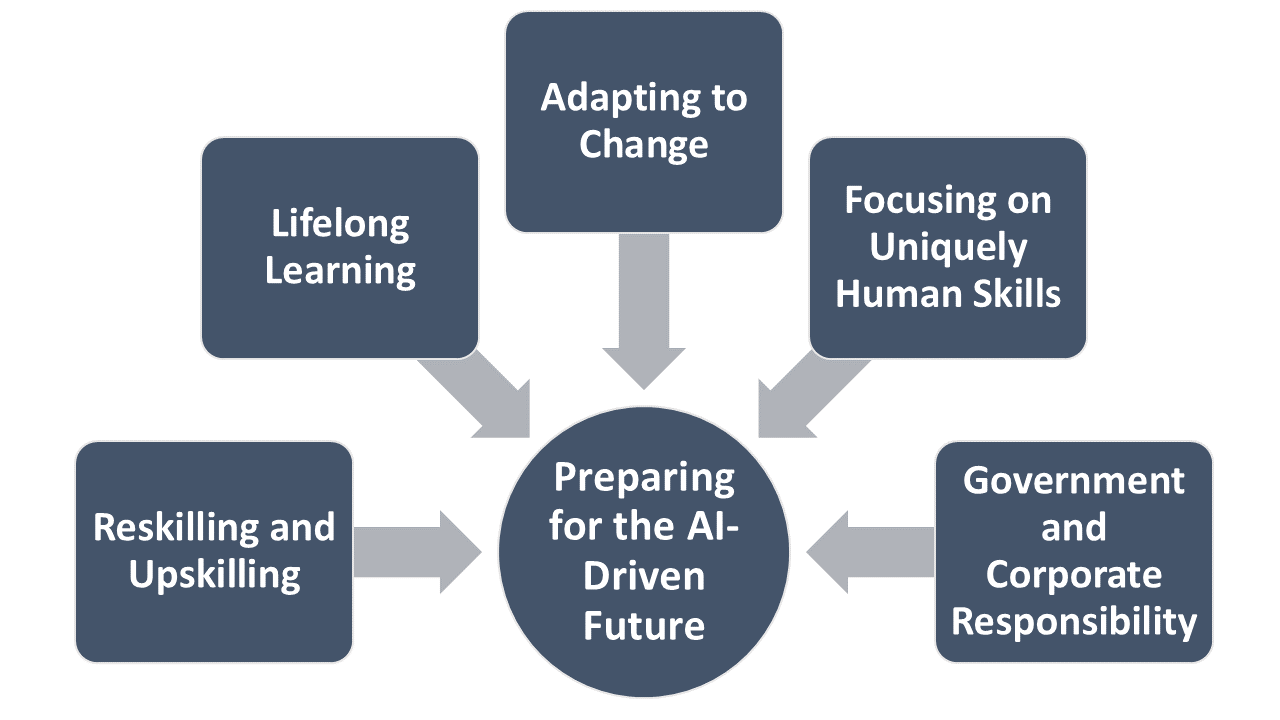Comments
- No comments found

In recent years, artificial intelligence (AI) has emerged as a transformative force across industries, driving both optimism and anxiety.
As AI continues to evolve, its potential to automate tasks and improve efficiency raises an inevitable question: Will AI take our jobs? This fear is compounded by frequent reports of layoffs, both in technology and other sectors, leading many to worry that AI might be accelerating job losses. But is this fear justified? In this essay, we will explore the impact of AI on the job market, the factors contributing to recent layoffs, and whether people should genuinely be afraid of AI's growing presence in the workplace.
To understand the current anxiety surrounding AI, it's essential to place it within the broader context of technological disruption throughout history. Technological advancements have always had profound effects on employment. The Industrial Revolution, for example, dramatically changed the landscape of work, replacing manual labor with machines and shifting economies from agrarian to industrial. This period saw widespread fear and resistance, with movements like the Luddites destroying machinery they believed threatened their livelihoods.
However, history also shows that technological advancements can lead to the creation of new industries and jobs. The rise of automobiles, for instance, displaced jobs related to horse-drawn carriages but created new opportunities in car manufacturing, road construction, and automotive services. Similarly, the advent of computers and the internet revolutionized nearly every industry, leading to the rise of entirely new job categories like software development, IT support, and digital marketing.
AI represents the latest chapter in this ongoing story of technological disruption. But unlike previous technologies, AI has the potential to automate not just manual labor but also cognitive tasks, leading to concerns that it could replace a broader range of jobs, including those traditionally considered safe from automation.
Artificial intelligence is a broad field encompassing various technologies designed to mimic human intelligence. These technologies include machine learning, natural language processing, computer vision, and robotics. AI systems can analyze data, recognize patterns, make decisions, and even learn from experience, allowing them to perform tasks that once required human intelligence.
Key Areas of AI Impact:
Manufacturing and Production: AI-powered robots and automation systems have been integral to modern manufacturing. These machines can work tirelessly, performing repetitive tasks with precision and speed. In industries like automotive manufacturing, robots handle everything from welding to assembly, significantly reducing the need for human labor on production lines.
Customer Service: AI has made significant inroads into customer service through chatbots and virtual assistants. These tools can handle a wide range of customer inquiries, from answering frequently asked questions to processing orders, reducing the need for large customer service teams.
Healthcare: AI is revolutionizing healthcare by assisting in diagnosis, treatment planning, and even surgery. AI algorithms can analyze medical images, identify patterns, and suggest potential diagnoses, often with greater accuracy than human doctors. In surgical settings, AI-powered robots assist surgeons, improving precision and outcomes.
Finance: In the financial industry, AI is used for algorithmic trading, fraud detection, and risk assessment. AI systems can analyze vast amounts of financial data in real-time, making decisions faster than any human could, which has transformed trading floors and back offices.
Creative Industries: Even creative fields are not immune to AI's reach. AI tools can generate music, write articles, design logos, and even create visual art. While these tools are often used to assist human creators rather than replace them, they raise questions about the future of creative jobs.
Software Engineers and Developers: AI is increasingly automating parts of software development, such as code generation and bug detection, which could reduce the need for entry-level developers. However, fully replacing software engineers is unlikely, as the field requires critical thinking, creativity, and a deep understanding of complex problems that AI cannot yet replicate. Instead, AI is expected to enhance the work of engineers, allowing them to focus on higher-level tasks while improving overall efficiency.

The fear of AI taking jobs is not unfounded, particularly as reports of layoffs in both tech and non-tech sectors dominate the news. However, it's important to recognize that layoffs are rarely caused by a single factor. Economic conditions, shifts in consumer behavior, and organizational restructuring all play significant roles.
Economic Factors: The global economy has faced significant challenges in recent years, including the COVID-19 pandemic, inflation, and supply chain disruptions. These factors have led companies to reassess their operations, often resulting in cost-cutting measures such as layoffs. In such cases, AI may be seen as a way to maintain productivity with a reduced workforce, but it is not the sole cause of job losses.
Technological Disruption: As companies strive to remain competitive in an increasingly digital world, they are investing in AI and automation. This investment can lead to workforce reductions, particularly in roles that can be easily automated. For example, in retail, self-checkout systems and automated inventory management have reduced the need for cashiers and stock clerks. In finance, AI-driven trading algorithms and robo-advisors are displacing traditional roles in investment banking and financial advising.
Shifts in Business Models: The pandemic accelerated the shift toward digital and remote work, prompting companies to reevaluate their business models. Some jobs, particularly those tied to physical office spaces or traditional retail, have become redundant as companies adapt to new ways of working. AI has played a role in enabling this transition by providing tools for remote collaboration, customer service, and logistics.
However, it's crucial to note that while AI contributes to job displacement in some areas, it also creates new opportunities. The demand for AI specialists, data scientists, and machine learning engineers is growing rapidly. These roles require skills in AI development, data analysis, and cybersecurity, offering new career paths for those willing to adapt and reskill.

The fear of AI taking jobs is often rooted in the perception that AI is an unstoppable force that will render human workers obsolete. While AI is undoubtedly powerful and capable of performing tasks that were once thought to require human intelligence, this fear may be overstated for several reasons.
Human Creativity and Emotional Intelligence: AI excels at tasks that involve data processing, pattern recognition, and decision-making based on predefined criteria. However, it struggles with tasks that require creativity, empathy, and nuanced understanding—areas where humans excel. Jobs that involve human interaction, emotional intelligence, and creative problem-solving are less likely to be fully automated. For example, while AI can assist in diagnosing diseases, the human touch is still essential in patient care, where empathy and communication are crucial.
New Job Creation: Just as previous technological revolutions created new industries and jobs, AI is expected to do the same. The rise of AI is leading to the creation of entirely new job categories, such as AI ethics specialists, data privacy officers, and AI trainers. These roles involve overseeing AI systems, ensuring they operate ethically and legally, and training AI models to perform specific tasks. Additionally, AI is likely to create demand for jobs in industries that do not yet exist, much like the internet gave rise to social media management and e-commerce.
Collaborative Work: Rather than replacing human workers, AI is increasingly seen as a tool that can augment human capabilities. In many fields, AI is being used to assist humans rather than replace them. For instance, in healthcare, AI can help doctors analyze medical images and suggest potential diagnoses, but the final decision is still made by a human doctor. In creative industries, AI tools can generate ideas or draft content, but the human touch is needed to refine and personalize the output.
Regulatory and Ethical Considerations: Governments and organizations are becoming increasingly aware of the ethical implications of AI. There is growing recognition of the need for regulations to ensure that AI is used responsibly and that its impact on the workforce is managed. Some countries are already implementing policies to protect workers from the negative effects of automation, such as retraining programs and social safety nets. These measures can help mitigate the impact of AI on employment and ensure that workers are not left behind in the AI-driven economy.

While the fear of AI taking jobs is understandable, it is not inevitable. The key to navigating the AI-driven future lies in preparation and adaptability. Workers, companies, and governments all have roles to play in ensuring that the transition to an AI-driven economy is as smooth and inclusive as possible.
Reskilling and Upskilling: One of the most effective ways for workers to prepare for the AI-driven future is to invest in reskilling and upskilling. As AI continues to evolve, the demand for skills in AI development, data science, and cybersecurity is growing. Workers who acquire these skills will be well-positioned to take advantage of new job opportunities in the AI-driven economy. Additionally, workers should focus on developing skills that are difficult for AI to replicate, such as creativity, critical thinking, and emotional intelligence.
Lifelong Learning: In an AI-driven world, the concept of lifelong learning becomes increasingly important. Workers must be willing to continuously learn and adapt to new technologies and processes. This may involve taking online courses, attending workshops, or participating in on-the-job training programs. Companies can support lifelong learning by offering training and development opportunities to their employees, helping them stay competitive in a rapidly changing job market.
Adapting to Change: Workers should stay informed about technological advancements and be willing to adapt to new tools and processes that can enhance their work. For example, in industries like marketing, AI-driven tools are being used to analyze customer data, optimize ad campaigns, and personalize content. By embracing these tools, marketers can improve their effectiveness and remain valuable to their employers.
Focusing on Uniquely Human Skills: As AI continues to automate routine and repetitive tasks, workers should focus on developing skills that are uniquely human. These include creativity, emotional intelligence, problem-solving, and communication. Jobs that require these skills are less likely to be automated, as AI struggles to replicate the nuances of human interaction and creativity.
Government and Corporate Responsibility: Governments and companies also have a role to play in preparing for the AI-driven future. Policymakers should implement measures to protect workers from the negative effects of automation, such as retraining programs, social safety nets, and policies that encourage job creation in emerging industries. Companies, on the other hand, should invest in their employees by offering training and development opportunities and creating a culture of continuous learning.
The rise of AI is undeniably transforming the job market, leading to both challenges and opportunities. While it is natural to fear the unknown, the key to thriving in an AI-driven world lies in preparation, adaptability, and a willingness to embrace change. Rather than fearing AI, workers should focus on developing skills that are in demand, staying informed about technological advancements, and being open to new opportunities.
AI is not an unstoppable force that will render all human workers obsolete. Instead, it is a tool that, when used responsibly, can enhance human capabilities and create new opportunities. By focusing on uniquely human skills, investing in lifelong learning, and staying adaptable, workers can not only survive but thrive in the AI-driven future. The fear of AI may be understandable, but with the right approach, it can also be an opportunity for growth, innovation, and a brighter future for all.
Ahmed Banafa is an expert in new tech with appearances on ABC, NBC , CBS, FOX TV and radio stations. He served as a professor, academic advisor and coordinator at well-known American universities and colleges. His researches are featured on Forbes, MIT Technology Review, ComputerWorld and Techonomy. He published over 100 articles about the internet of things, blockchain, artificial intelligence, cloud computing and big data. His research papers are used in many patents, numerous thesis and conferences. He is also a guest speaker at international technology conferences. He is the recipient of several awards, including Distinguished Tenured Staff Award, Instructor of the year and Certificate of Honor from the City and County of San Francisco. Ahmed studied cyber security at Harvard University. He is the author of the book: Secure and Smart Internet of Things Using Blockchain and AI.
Leave your comments
Post comment as a guest